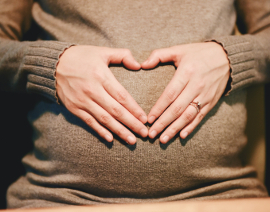- 905.829.0724
- info@yourhealthwellnesscentre.com

As a father, understanding pregnancy-related changes was crucial for me. This information is not only important for mothers, but also for fathers. Experiencing the whole pregnancy process with my wife – not just what I learned reading books and writing my exams – really helped me better understand the importance of the prenatal, perinatal, and postnatal period and how physiotherapy can help with day-to-day activities during this time. The key things I learned were what to do and what to avoid.
Physiotherapy during pregnancy can help in many ways, starting with understanding the changes the mother’s body is undergoing to prepare her for childbirth. Pregnancy is a complex process and numerous changes occur, such as an increase in body weight and changes in her base of support, line of gravity, and walking pattern. Mothers also retain fluid during pregnancy and go through hormonal changes, including releasing relaxin. Relaxin helps increase the extensibility of ligaments, which is pivotal during child birth. A Physiotherapist can explain the right exercises and selective stretching techniques to embrace the changes and make pregnancy and the postpartum period comfortable for the mother.
Having a healthy core is also important, as the ligaments have been lax due to the influence of hormone relaxin. The core has to be strengthened to support structures well. A good core-strengthening exercise program will help avoid unnecessary stress and strain on soft tissues and supporting structures during and after pregnancy.
Our bodies have a tendency to revert to postures that are most comfortable; however, these might not be correct or healthy and can lead to aches and pain. Physio can guide you to correct your postures and incorporate healthy postures into your daily routine, which will help decrease pain. As the body also prepares for child care, there is a tendency to have rounded shoulders, which will help the mother for breast feeding, soothing the child in her arms and provide care; however, these changes do not reverse automatically, so a carefully chosen exercise program is required to resume healthy posture.
Pregnancy can also sometimes increase pre-existing back and pelvic girdle pain, so physiotherapy will help in addressing these challenges and avoiding further damage.
During labor, the muscles of pelvic floor undergo a lot of trauma and it is common to compromise the pelvic floor musculature. This can lead to challenges such as urinary incontinence, which can be overcome with pelvic rehabilitation to strengthen the muscles of the pelvic floor to regain full control.
Ask us for a short education and exercise session.